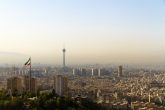March 01, 2017
While Lobbing Rhetorical Bombs at China, Trump Risks Friendly Fire
During the campaign, Donald Trump’s foreign policy platform was decidedly lacking in detail. A notable exception, however, was the purportedly unquestionable villainy of China. China was a jobs thief, Mr. Trump claimed, manipulating its currency to prop up its exports and exploiting bilateral trade arrangements so as to tilt the scales against American competitors. In his trademark restrained and contemplative style, Mr. Trump accused previous American leaders of allowing Beijing to “rape” the United States and carry out “the greatest theft in the history of the world.” Many countries were to blame for the decline of working-class America, Mr. Trump claimed, but China was the chief wrongdoer among them.
Except that China no longer seems to exist, and the chief threat to American blue-collar jobs comes from within our borders — not abroad. President Trump, in clinging to this narrative, promises to fight a war long past with weapons that are likely to hurt his allies as much as his supposed enemy.
While there was a time that some factory-floor jobs were indeed offshored to China (likely the late 90s to early 2000s), most economists agree that this is no longer the case. Over the long term, automation is, and will likely continue to be, the true threat to blue-collar American workers. Chinese factory-floor wages have risen quickly in recent years, and they are now the highest in Asia, so much so that Chinese companies are now seeking cheaper labor in other parts of the continent. China’s currency, while likely undervalued for a time, has stabilized to the point that their central bank is working to strengthen it.
Read the full article at China-U.S. Focus.
More from CNAS
-
America Must Salvage Its Relationship With India
The longer the current crisis lasts, the harder it will be to restore the relationship and the more likely it is that the two countries will lose an entire generation of progr...
By Richard Fontaine & Lisa Curtis
-
Indo-Pacific Security / Technology & National Security
AI and Policy, Both Foreign and DomesticIn an episode recorded just before Christmas, Darren interviews Janet Egan, Senior Fellow and Deputy Director of the Technology and National Security Program at CNAS, about AI...
By Janet Egan
-
25% Tariff Threat Torments Tehran: What Will Be Trump’s Next Step? Experts Weigh In
In this episode of Newstrack, Maria Shakeel examines the escalating crisis in Iran as the nation faces its deadliest wave of unrest in decades. Citizens are protesting soaring...
By Lisa Curtis
-
Trump Renews Push to Annex Greenland, Tensions Rise
European allies issued statements supporting Denmark and Greenland's sovereignty, warning forcible takeover could endanger NATO. Danish PM Mette Frederiksen reiterated Greenla...
By Lisa Curtis




